Prestashop is an open source ecommerce platform that users can have hosted in the cloud or downloaded from the Prestashop website. Used by thousands of business organizations and entrepreneurs all over the world, Prestashop is one of the most popular online store starter solutions, boasting of extensive and robust features and integrations to help users build their online stores from scratch. The system is backed by a large community with over 800,000 members who are working to keep Prestashop exclusively dedicated to opens source ecommerce.

Why choose Prestashop? Here are some of the very good reasons why:
- It is free forever with a community of opens source experts supporting it to keep it that way.
- Building online stores from scratch is very easy. Store elements are customizable so users can bring in their corporate elements and make the stores their own. Stores and internal functions can be improved with add-on modules.
- Expert and comprehensive training materials are provided for users at all levels, ensuring that you get the most out of your Prestashop online store.
- Extensive feature sets for managing product listing, payments, shipping, manufacturers and suppliers.
- Integrations with a wide host of leading business services and applications.
Free – PrestaShop is the industry’s first and only freemium, fully hosted and supported open source e-commerce platform, available for download or hosted in the cloud. PrestaShop’s open-source software allows merchants to have a total customizable, up-and-running store in minutes and without the license fees or revenue percentages that PrestaShop’s competitors charge,making e-commerce more accessible around the globe. The freemium platform is empowering retailers all over the world to create localized, customizable e-commerce stores with ease and scalability.
Open-source – PrestaShop’s software is completely open-source, allowing merchants and developers to build infinitely customizable sites, and draw on one another for support and inspiration. PrestaShop’s users also benefit from the additional support and innovation of the software’s 850,000 member open-source community. PrestaShop’s community members have made countless invaluable contributions to PrestaShop’s software – including the translation of the software into 65 languages and the development of thousands of modules and themes available in PrestaShop’s Addons Marketplace, further eliminating the technical, language and financial barriers to entrepreneurship.
Features
Ease of use
Setting up PrestaShop can take a bit of time because its backend is more technical. However, PrestaShop provides a demo to take you through the whole process. After the setup process is complete, the next step is to decide which modules you need for your online store. If your tech expertise is limited, it’s wise to seek a web developer to take care of the integrations for you. Luckily, once you’re done with the setup, integrations, and modules, daily operations such as product creation, order management, and inventory are simple.
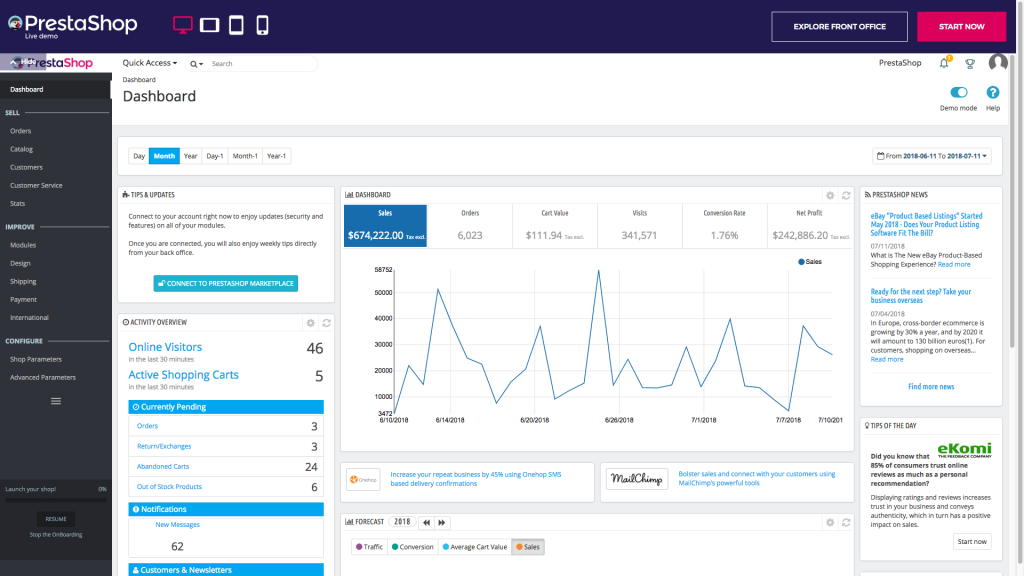
Store customization
Fact is- open source is the way to go if you want your website to have a unique feel. In the highly competitive world of ecommerce, building a memorable brand is the key to your long-term success. To customize an online store, you will need two modules. One that’s easy to make quick edits and an advanced module for changing the code to customize your store to your liking. This is why you will need access to CSS, HTML and JavaScript files.The customization tools in PrestaShop will help you to complete product organization, create an internal search engine tool to help customers easily navigate your store or set up different payment methods. You will also find over 1500 templates and a vast collection of customizable themes in the PrestaShop official marketplace. Third parties develop most of these templates and that’s why you can end up paying from around $60 for a high standard template from PrestaShop certified partners.

Product creation
PrestaShop features an intuitive product creation area where you can list as many products as you’d like to sell. You can also configure features to display expiry dates for time-sensitive products. You can also sell downloadable products using PrestaShop. Apart from this, you can also manage your inventory and set restocking alerts whenever a product goes out of stock. It also includes an SEO section where you can enter a Meta title and a Meta description.
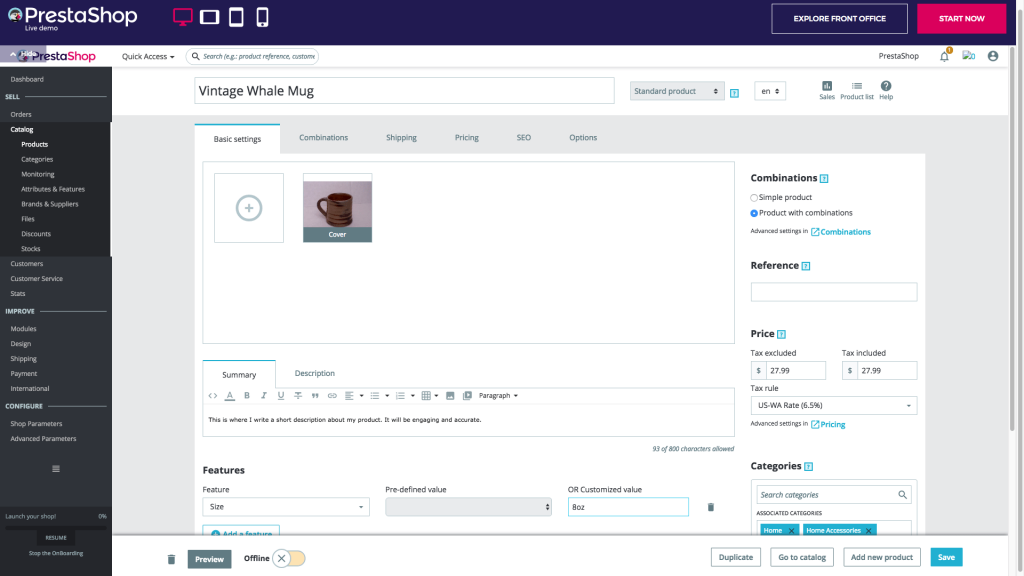
Web Design
The PrestaShop store hosts over 3,000 mobile responsive web templates created by third-party designers. The only free option is the default theme that comes with every software download. The rest are priced between $50 and $530, and quality varies theme by theme. Because PrestaShop is open source, you have full access to the code that was used to build your site. You (or your hired developers and designers) can get up to your ears in code and customize the site to look and work exactly the way you want it to.
If you don’t have access to tech talent, however, there’s a WYSIWYG (what you see is what you get) editor available to make changes to your default theme. Using the WYSIWYG editor, you can add your own logo and change page layouts without touching any code at all. You can also use the WYSIWYG editor to update your pages’ content.
PrestaShop Ready does things a little differently when it comes to web design. You will not be able to access that huge marketplace of themes. Instead, you’ll have to choose from the 10 themes available in your admin. Here are those themes:

These themes can be edited with HTML and CSS or by using the built-in WYSIWYG editors.
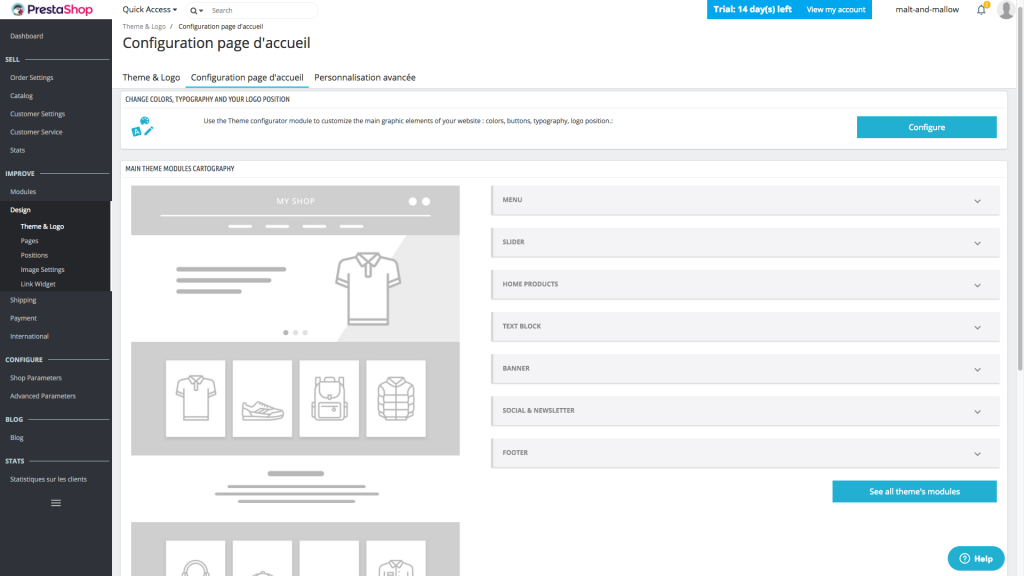
Google rich snippets
The sheer number of people searching for products on Google shows that ranking on SERPs is crucial. Rich snippets are codes that make it easy for search engines to organize information. This offers shoppers the ability to see products that they search for and compare prices. This is why you should add Google Rich Snippets to your product links and give an immediate boost to your SEO efforts. The Google Rich snippets are in the PrestaShop add-ons marketplace. Leverage it to improve your reach and the shopping experience for customers.
Marketing
Even though you have to go the extra mile to find custom features, PrestaShop boasts an extensive list of built-in marketing tools. Some of these options include:
- Special offers
- Discount mode
- Coupon codes
- Free shipping
- Email marketing
- Gift wrapping
- Affiliate programs
Payment processing
To make your site fully functional to accept payments, you need to setup a payment gateway. PrestaShop supports a wide range of payment gateways including PayPal, Bambora, Discover Global Network, Amazon Pay, Worldpay, First Data and Authorize.Net. It also has over 250 payment providers as add-ons. In contrast, PrestaShop Ready has only four payment options. These include Stripe, PayPal, bank transfers and check payments.
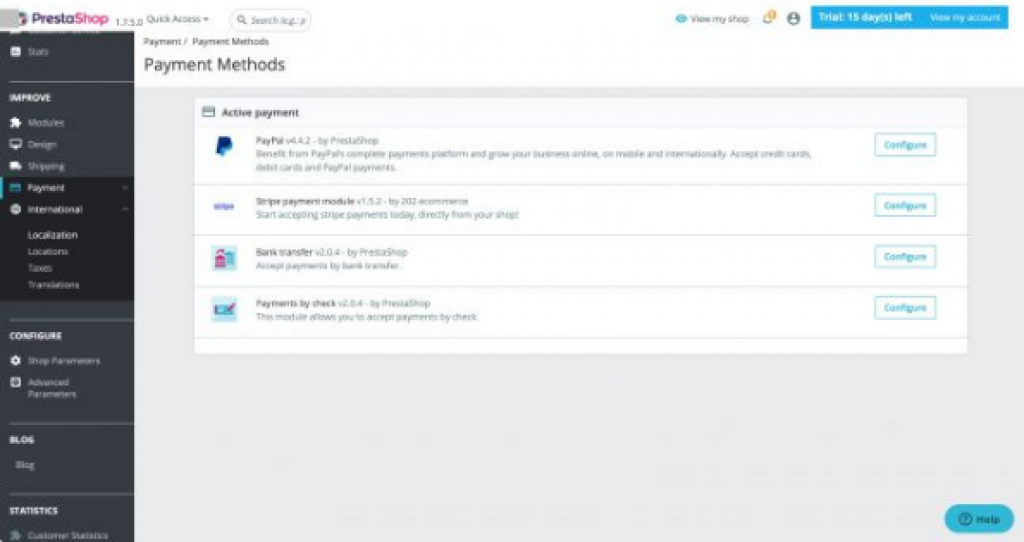
Customer relationship management
To keep in touch with your customers, PrestaShop allows you to send automated emails after a transaction to give them a sense of security. You can also set promotions targeted to specific products, orders or customer groups. To reduce abandoned cart rate, PrestaShop lets you email customers to remind them about the products they have left in their carts.
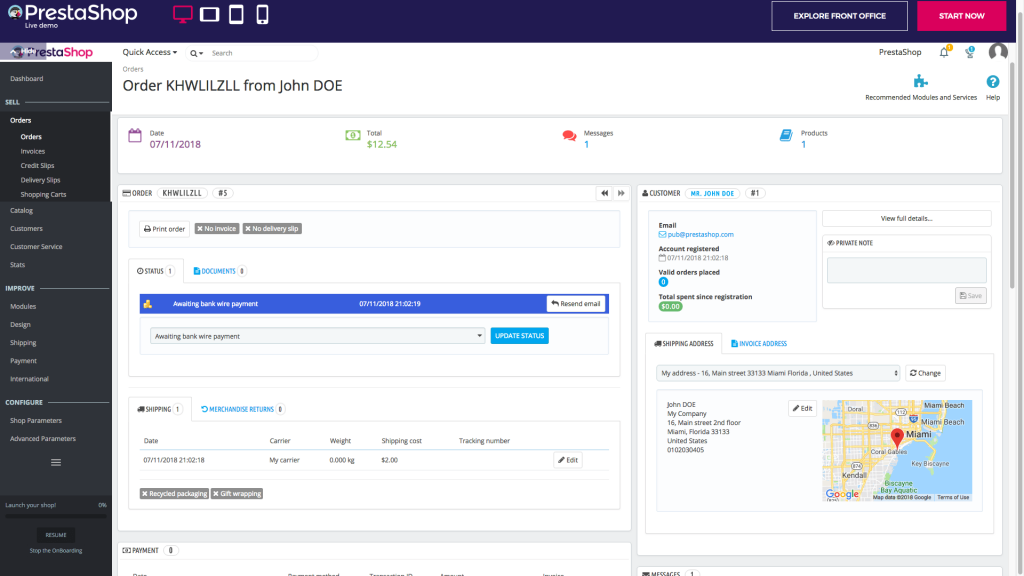
Legal support
The ability to comply with laws is an essential part of running an online store. PrestaShop comes with shopping cart tools that make your shop compliant with the laws of a specific country. This is a huge plus as you don’t usually see legal support through ecommerce solutions. With PrestaShop, you even get design tools for creating quick pages that explain some legal information to your customers.
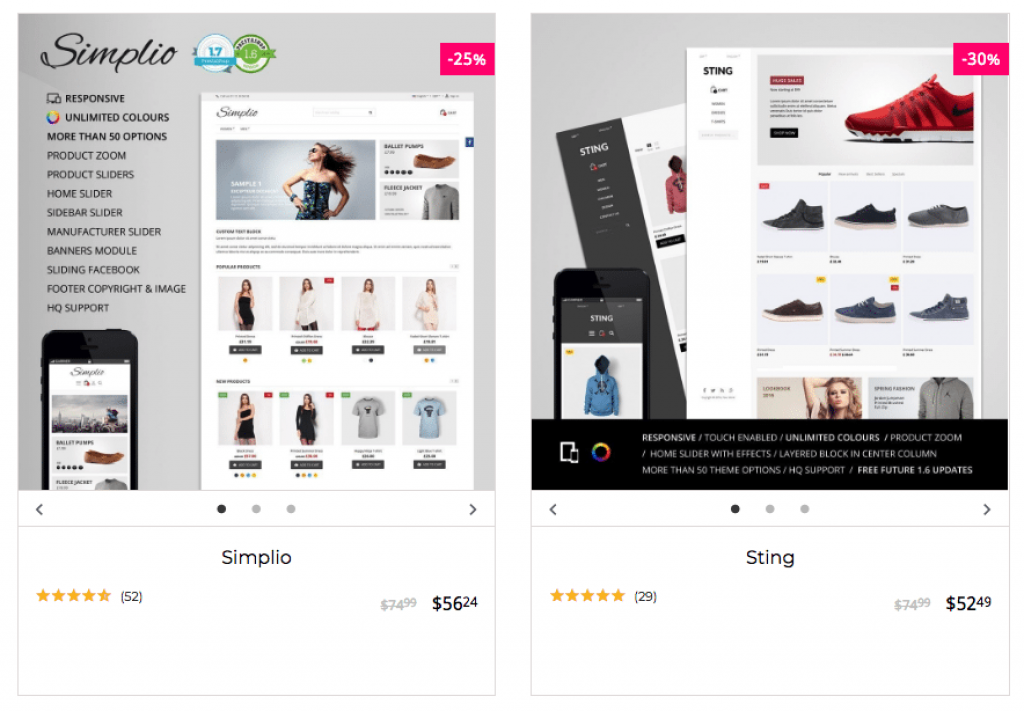
Security
The open source version of PrestaShop is PCI Compliance ready. This means that you’ll have to do this process yourself. Therefore, you’ll have to buy an SSL certificate and regularly check in on security patches. On the other hand, the PrestaShop Ready version has its security accounts already updated for you. This is because it’s hosted on the Google Cloud platform that includes a free SSL certificate.
Integrations and add-ons
PrestaShop has many integrations available in their marketplace. Some modules are free while others are available as one-time purchases. It’s true that adding integrations to boost your site using PrestaShop can end up being more expensive than the SaaS alternatives like Shopify. However, once you sell high volume, you come out on top with PrestaShop.
Besides this caveat, the second one is usually the deal breaker for most merchants. The modules are created by different developers and may not be compatible with each other. This may lead to a glitch site and PrestaShop cannot always help out on this issue. The PrestaShop version limits access to the entire marketplace. This way, users only get to use the module’s built-in to the platform.
Pricing
While PrestaShop does not offer a free trial, they do have a demo available. This demo gives you a chance to explore the admin and storefront on many devices. Everything’s already filled in with sample information, so you really get a good feel for how the software works on a daily basis. Setup costs for PrestaShop are as low as can be. However, you can expect some extra expenses for hosting.
Ongoing expenses vary depending on a number of factors. PrestaShop is not the easiest software to use; it can be difficult to set up, and modules often interfere with one another, leading to an overall glitchy site. If you don’t know how to resolve technical issues on your own, you’ll probably have to hire web developers and designers to do the work for you. Furthermore, modules and add-ons often come at a steep price. If you want to integrate your site with QuickBooks, Amazon, eBay, Facebook, and/or TaxJar, you may end up paying a pretty penny.
PrestaShop Ready, on the other hand, is not a free software option. To use PrestaShop Ready, you’ll have to subscribe to a monthly plan. PrestaShop Ready currently only offers one pricing level, but they are planning to add two more advanced levels with even more features soon. Let’s take a look at PrestaShop Ready’s current pricing:
Start: €24.90/Month
- Unlimited Products
- Unlimited Employee Accounts
- Unlimited Images
- Data Export
- Customizable Themes
- Mobile Version
- Blog
- Newsletter (Free Up To 12,000 Shipments/Month)
- 7/7 Support
- Payment By Card Or PayPal
- Shipping With Major Carriers
- 0% Platform Fees Up To €3,000 Turnover (After That Fee Is 2%)
- Hosted On Google Cloud Platform
- SSL Certificate
- Multiple Languages & Currencies
If you choose to pay for an annual subscription, you’ll benefit from a 20% discount.
Competitors
Wix: Wix has become pretty well known over the last few years, in part due to budget-busting marketing campaigns starring stars like Heidi Klum, Jason Statham and Gal Gadot, better known as Wonder Woman. Today, Wix is the biggest player in the website building landscape and hosts a whopping 110 million websites. Wix allows users to create websites using a simple and intuitive drag-and-drop user interface. A Wix website can be used for:
- blogging
- hosting an online forum
- building an online store to sell digital and physical products
- appointment booking
- collecting contact details and more
PinnacleCart: PinnacleCart is a leading hosted ecommerce software platform that provides a robust all-inclusive online store builder that allows you to custom design an online store, manage product catalogs, create marketing campaigns, collect web analytics and so much more. PinnacleCart also caters for international customers since it supports multiple languages and currencies. They offer free migration from over 40 different shopping carts, as well as design and SEO services.
UltraCart: UltraCart is an older eCommerce solution, dating back twenty-one years. Originally, it was a copy-paste solution. You could use bits of code to embed UltraCart into your already-existing website without changing the site’s look and feel. Over the past few years, UltraCart has grown to include a hosted shopping cart solution, one that’s more in line with the current cloud-based trend. UltraCart offers scalability to its customers along with robust inventory management tools. However, what it has gained in functionality, it has lost in usability. Many successful businesses use UltraCart for their online stores. Current clients include Pike Place Fish Market and Hobby Zone, among others.
CoreCommerce: CoreCommerce is premium cloud-based e-commerce software that truly makes creating and managing an online store a fuss-free experience. CoreCommerce is an easy-to-use and feature-rich e-commerce software platform, with no transaction fees, free shared SSL, automatic updates, simple setup and access to hundreds of themes and must-have features. It provides a 15 days free trial with no credit card required. CoreCommerce’s cheapest e-commerce software plan is $19.00 per month.
Summing Up
The main reason PrestaShop is so special is that it’s a free, open-source e-commerce solution without a clunky or complicated interface. They even have a one-click setup for hosting, so the complete beginners don’t have to set out on a hunt for the perfect hosting company. The open-source nature means that you get support from a wide range of sources. People are talking about PrestaShop constantly, so you can expand your knowledge by exploring the forums and blog posts.
In addition to this, the large collection of themes and modules takes PrestaShop to the next level. Most users find at least a handful of visually appealing themes for their stores, and the modules are interesting to test out as well. PrestaShop is definitely a solid choice if you need to set up an online store with plenty of customization options. But if you’re looking for an all-in-one solution that is a bit more hands-off, this one might not be the right choice.